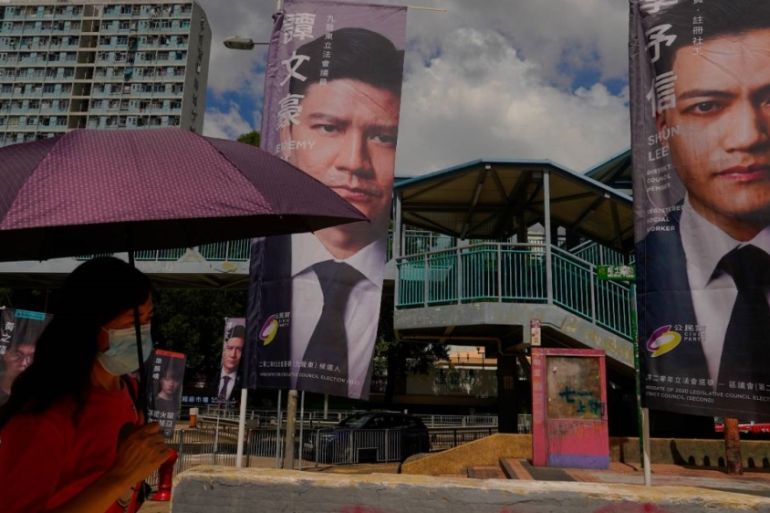Party members in sights as US mulls more sanctions over Hong Kong
Hong Kong leader Carrie Lam and Communist Party members among those under consideration as possible targets.

US President Donald Trump has not ruled out further sanctions against top Chinese officials, including Hong Kong Chief Executive Carrie Lam, in response to their handling of the political unrest in the semi-autonomous territory, a White House National Security Council spokesman said.
“In no way has he taken anything off the table with respect to further sanctions of party officials for actions in Hong Kong or on other issues. Any suggestion otherwise by anonymous sources is flat out wrong,” National Security Council spokesman John Ullyot said on Wednesday.
Keep reading
list of 4 itemsCohen admits to stealing and other takeaways from day 19 of Trump’s trial
Cohen faces more cross-examination as Trump’s trial enters final stretch
Key takeaways from day 18 of Donald Trump’s New York hush money trial
The Hong Kong Autonomy Act, which Trump signed on Tuesday, allows him to impose sanctions and visa restrictions on Chinese officials and financial institutions involved in the imposition of China’s new national security law in Hong Kong. He announced the end of preferential treatment of Hong Kong.
|
|
Bloomberg reported Trump had ruled out additional sanctions on top Chinese officials to avoid escalating tensions, but a person familiar with the matter told Reuters news agency that White House discussions on potential targets for sanctions were continuing and no final decisions have been made.
Among names being suggested as a possible target for sanctions is Lam, who backed the implementation of the security law, the source said.
The New York Times reported later that the Trump administration was considering a sweeping ban on travel to the United States by members of the Chinese Communist Party (CCP).
In response to Beijing’s broken promises, President @realDonaldTrump has taken steps to end Hong Kong’s preferential treatment and announced the United States will place a special focus on the admission of Hong Kong residents as refugees. We stand with the Hong Kong people.
— Secretary Pompeo (@SecPompeo) July 16, 2020
‘Unreasonable meddling’
Ullyot, the national security official, noted that last week the president imposed sanctions against CCP officials for their treatment of minority Uighur Muslims in China.
Secretary of State Mike Pompeo said the legislation Trump signed and an executive order ending Hong Kong’s special status under US law were justified.
“General Secretary Xi Jinping made a choice to violate the Chinese Communist Party’s promises to Hong Kong that were made in UN-registered treaty. He didn’t have to do that and he made that choice,” Pompeo told reporters.
Pompeo noted on Twitter later on Wednesday that Trump said the US would “place a special emphasis” on admitting Hong Kong residents as refugees.
“We stand with the Hong Kong people,” Pompeo said.
As the US reiterated its support for the territory’s residents, China’s top representative office in Hong Kong condemned what it called gross interference, labelling Trump’s recent move to end the city’s special status as “gangster logic and bullying”.
|
|
The Hong Kong Liaison Office said sanctions would not have a substantial effect on the special administrative region and were more likely to damage the interests of the US.
“Unreasonable meddling and shameless threats by the United States are typical gangster logic and bullying behaviour,” the statement said.
The national security law imposed by Beijing in Hong Kong punishes what China broadly defines as subversion, secession, terrorism and collusion with foreign forces with up to life in prison.
Critics of the law fear it will crush the wide-ranging freedoms promised to the former British colony when it was returned to Chinese rule in 1997. Supporters say it will bring stability to the city after a year of sometimes violent anti-government protests.
The Chinese government said it had a sovereign duty and legitimate right to maintain national security in Hong Kong and end the “chaos” caused by the protests last year.